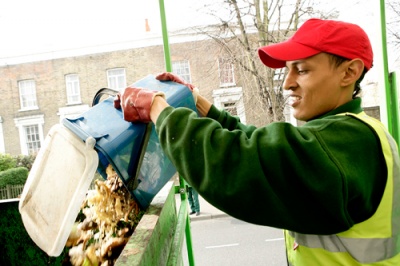UK public values waste collection over other council services
The UK public is more satisfied with their local waste and recycling collections than any other council service, according to a survey published by the Association for Public Service Excellence (APSE).
APSE, a local government body working to promote effective public services, commissioned market research agency Survation to carry out the survey, to gauge public attitudes to local neighbourhood services.

Respondents also rated their support for other council services, like school meals, and local council leisure facilities, such as swimming pools, gyms and playing fields and parks.
The survey of 1,539 people from across the UK found that over three quarters of the public want to see more of their taxes spent in the local area rather than on national infrastructure schemes.
When asked whether the government should spread money around councils or use it on a national level, 77 per cent wanted more spent at a local level, and respondents suggested that waste and recycling collections should be the second highest priority for any extra money, behind general road maintenance.
Residents want more local decision-making
According to APSE, people are calling for money to be spent more locally, suggesting that Chancellor Philip Hammond is ‘out of step with voters’. Eight times as many trusted their local councillors (57 per cent) over government ministers (seven per cent) to make decisions about their local area, and six times as many trusted their local council (60 per cent) to provide services in their local area over a private company (10 per cent), rising to nearly nine times compared to the government (seven per cent).
The survey suggests that the public would welcome localised infrastructure investment.
Interpreting the results, the Local Authority Recycling Advisory Committee (LARAC) noted: ‘A significant section of the population perceive a decline in local services in their areas and indicate that they consider councils have managed local services well in spite of the high level of cuts meted out by government.’
 Speaking about the survey findings, APSE Chief Executive Paul O’Brien said: “Whilst the extra infrastructure spending promised by the Chancellor is welcome in areas like housing and roads, it is clear that the public want to see more money going to local areas.
Speaking about the survey findings, APSE Chief Executive Paul O’Brien said: “Whilst the extra infrastructure spending promised by the Chancellor is welcome in areas like housing and roads, it is clear that the public want to see more money going to local areas.
“Local spending is proven to be a great way to bolster economic activity in local areas, so clearly there is an awful lot of good to come from leveraging more local investment through trusted council neighbourhood services.”
Satisfaction trumping negative press
This high satisfaction with refuse and recycling services comes despite a lot of negative press in national and local media around the trend of decreasing bin collection frequency and the efficacy of waste collections in general.
It was reported in August, for example, that a freedom of information request by the BBC had revealed that the amount of recycling rejected due to contamination in England increased by 84 per cent in the last four years, causing worry that residents may lose confidence in their recycling systems.
However, LARAC had said in response to the figures that councils were unfairly criticised in the fallout to a sharp rise of household recycling contamination, and Andrew Bird, Chair of LARAC, said that the industry should be working with local authorities rather than blaming them, remarking that few other industries ‘so publicly help create myths and difficulties for itself by talking about confusion so often’.
Indeed, Peter Jones and Andy Grant from Eunomia Research & Consulting have questioned whether the figures resulted from an actual increase in contamination, suggesting they may have simply resulted from improvements in reporting and processing.
The ‘Neighbourhood Services Poll’ report is available to read on the APSE website.





